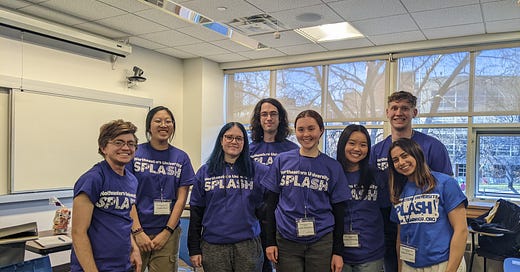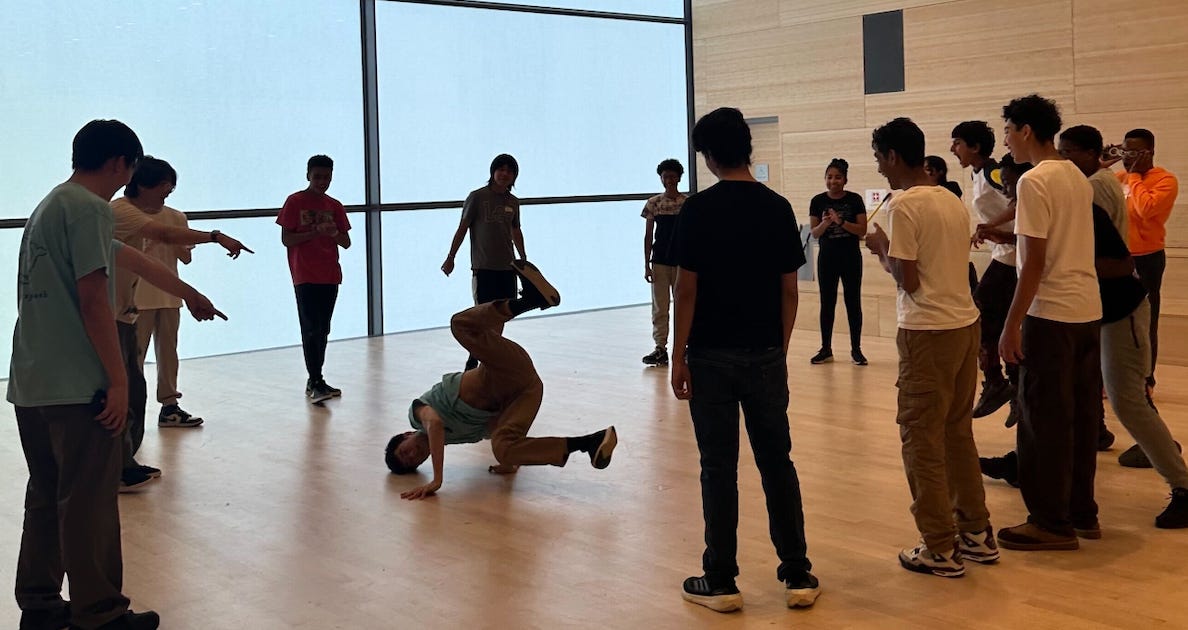🎉 Concluding 2023-24 Splash Chronicles 🚀
Celebrating the end of another Splashy academic year! Highlights from recent Splashes, be part of LU, classroom resources, and website updates
✅ tl;dr: LU-wide announcements
This academic year’s Splashes have wrapped up! MIT and Northeastern in March; Yale, Clark, Princeton, UCLA, Johns Hopkins, UC Berkeley, and Cornell in April; and Stanford Splash marked the grand finale last weekend. Cheers to another year of spreading excitement for teaching and learning!
If you are a Splash chapter representative and would like to join the Chapter Board meetings but are not on the mailing list, please email our new Chapter Board Chair, Haven Whitney (Stanford) at havenw@stanford.edu.
Noticed anything new? Check out the most recent web updates.
🕵️ We need YOU! 🫵 Recruitment alert!
Become a mentor and help growing programs navigate challenges and make bigger impact. Apply or email: mentoring-chairs@learningu.org
Become a board member and facilitate high-level discussions on the direction and initiatives that support LU’s mission. Apply by May 31. Email: nomcom@learningu.org
Become a web wizard. No need to be an expert coder! Join #web-development. Email: web-team@learningu.org
Join LU! Tell us about your interests here. Email: info@learningu.org.
🤖 Resources and communication
Check out these classroom resources that can help you design a super engaging class! Also, here’s a self-guided lesson planning worksheet.
Check out the LU handbook and Website documentation on Github.
📢 Tell us your experiences! Spread the news!
Fill out this short survey to share your teaching experiences—a cool class you have taught or seen, your secret teaching tactic, or golden moments of learning you witnessed!
Have any news, tips, or comments to share? Email us stories to be featured on our next newsletter, or send us feedback.
Get one new member on your team to subscribe to this awesome-possum newsletter to receive (roughly) bimonthly posts.
🚗 News From the Road
This Spring, a whopping 12 programs made Splashes nationwide. In March, MIT hosted their Spring HSSP and Spark programs, and Northeastern hosted a Splash. In April, Yale, Clark, Princeton, UCLA, Johns Hopkins, UC Berkeley and Cornell each hosted a Splash program. Stanford Splash made the grand finale of this academic year last weekend. A big round of applause to all!
We’re excited to share some highlights from programs, including from Splashers who traveled across the country to visit and learn from each other:
Jordan (Berkeley/LU) reports back from Northeastern Splash
This Spring, I was fortunate enough to visit Northeastern Splash. Having been a teacher and admin only at medium-to-large, 200+ student Splashes, it was an excellent experience to see some of the different things a small Splash can do! Here are some things that stood out to me about the program:
⏳ Student waiting rooms: Northeastern Splash was held entirely on one floor of a building. While the building had a bit of seating, the Northeastern team had classrooms for everything. In the morning, students trickled into a chill waiting room and chatted with friends until the first class. I really liked Northeastern’s lunch rooms: there were three rooms set up with crafty activities during the lunch period, as well as a dedicated quiet lunch room.
📝 Real-time surveys: Northeastern does a great job at collecting LOTS of student feedback, enabled by real-time surveys. Teachers received feedback forms to hand out to their class, and the day ended with a final survey period with snacks.
🏃 Volunteers: Once of the Northeastern admins, Maddie, has been doing lots of outreach to APO, a service fraternity, resulting in a bunch of volunteers! Volunteers were also given Dominoes lava cakes as a fun token of appreciation.
🌈 Class variety: The variety of course topics was great, and included very hands-on activities such as lava lamp making. I taught a math class on hamming codes and puzzles.
🍀 Adaptability to the outside: I was impressed with the level of organization at Northeastern Splash, balancing many classrooms and dealing with an unexpected flood of festival goers entering the building during the Holi festival going on outside (usually asking where the water fountains were), which absolutely packed the courtyard just outside of our building.
Thanks to the Northeaster team, especially Caitlin (my main point of contact), for having me, and congrats to them on a Splash well done!
Sofia (Princeton/LU) and Henry (UCLA) share some highlights from Princeton Splash and UCLA Splash on April 20th, 2024:
On April 20th, over 200 high school students from all over the tri-state area traveled to Princeton and took classes on breakdancing, rocket science, Tetris, molecular biology, Wrestling, and more! Top: Introduction to Breakdance; Bottom: 6 degrees of Kevin Bacon | An intro to Graph Data Structures & Algorithms
Top: Bystander Emergency Care at Splash at UCLA; Bottom: UCLA admins—Marina, Leil, and Sarala—with Cindy (MIT) who visited, at the student check-in desk. Thanks also to Fiona (MIT) for flying all the way to the west coast!
Lastly, Miles (LU), who visited Yale Splash with a former LU mentor Amy, says …
For any organizer interested in attending another Splash program, to teach, volunteer, or simply observe, I highly recommend reaching out to your LU mentor to facilitate the trip. Either way, please let us know about your experience! Fill out this short survey to share your teaching experiences, or send your thoughts to newsletter@learningu.org.
🛹 News From the Board
📖 Sofia (Princeton/LU) introduces LU’s Chapter Services
We are so grateful for all of our volunteers, and we want to highlight some of the great things happening in different divisions of LU. For this newsletter, we wanted to feature Chapter Services, led by Miles (LU).
A central part of LU’s mission is to support Splash programs throughout the country. Volunteers in the Chapter Services Committee give guidance to established Chapters by connecting regularly with Chapter leaders. Chapter Services serves as a source of knowledge and support for directors throughout all stages of a Splash program. People interested in starting a new Chapter at their school work first with the Mentoring Services until they become an Associate Chapter, when they are matched with a Chapter Services volunteer to help them continue to grow and organize successful programming each year.
If you are someone interested in helping Chapters and have experience organizing a Splash program, we would love for you to join Chapter Services! We hold meetings (once every two months), exchange updates, have discussions, push changes, and report information for the Chapters’ benefit, but the flow of information goes in both directions to and from the Chapters and LU itself. Ask Miles questions!
⛱️ Join LU, the umbrella organization that unites all of the Splash programs at about 40 different schools around the world!
Join LU as a volunteer to make nation-wide impact. Tell us about your interests here or email info@learningu.org. As part of LU, you can …
Help growing programs navigate challenges with recruitment, logistics, etc. as a mentor, and help chapters make bigger, better impact. Email mentoring-chairs@learningu.org to apply or ask any questions.
Facilitate high-level discussions on the direction and initiatives that will support LU’s mission, as part of the LU Board of Directors. Apply to be a board member by May 31st. Email nomcom@learningu.org with any questions.
Develop intuitive web environments with the web team. No need to be an expert coder already! Join #web-development on Slack or email web-team@learningu.org.
or work on anything else that inspires you, on your own time! If you have a cool idea, or if you’re interested but unsure where to start, let us know your thoughts here and/or email info@learningu.org.
🧑🏫 Classroom Resources of the Month from the LU Pedagogy Team
Vivian (MIT/LU) shares resources for making engaging STEM classes
One challenge in teaching a great Splash class is how to make the class engaging for students. While using slides and the board is a straightforward method and plan, using other classroom resources can help your students interact more with the content and have a more enjoyable experience. There are tons of resources online, but I just want to highlight a couple of resources that I have used in my classroom and recommend. I am aware that the ones I share below are quite specific, but are resources other teachers can consider using if they happen to teach such subjects.
HHMI Biointeractive: This is one of my favorite biology resources because of its breadth and depth. What I love about this platform is the diverse range of classroom materials, from interesting case studies to fun interactive online activities. The curriculum developers do a great job showing biology’s real-world applications to understand diseases, evolution, and other big questions. I used this resource when I taught cancer biology and biotechnology to high school students. The videos have good visuals, and the lesson plans come with many materials and documents.
Protein Data Bank (PDB) 101: This educational resource is great for introducing students to the fascinating world of proteins and structural biology. In fact, it is the reason why I got interested in this subject in the first place. The website has a database of various categories for proteins, from antimicrobial resistance to drug action. The illustrations are colorful, and the website allows students to gain a better understanding of protein structure. What makes PDB 101 rich is the fascinating molecule of the month articles and the well-put video challenge learning resources that explore a different theme each year.
I hope these resources are a source of inspiration, especially for those who plan to teach a Splash class in the life sciences. If you want to find more science resources, or classroom resources in general, you can find more by clicking on this link of resources that I compiled! More will be added in the future.
❣️Important! Website updates from the Web Wizards Will (LU), Katherine (LU), and Miles (LU) 🧙
🛠️ Due to changes in how Gmail and other email clients are now handling certain kinds of emails, we have made the following changes:
📧 Emails from the Comm Panel can now only be sent from email addresses ending in @learningu.org or @subdomain.learningu.org (e.g., @yale.learningu.org). If you have a custom domain that should work too (e.g., stanfordesp.org). Each site now has a "info@yoursitehere" redirect that should redirect to your chapter's email address (e.g., info@yale.learningu.org now redirects to yalesplash@gmail.com) and will be used by default in the Comm Panel. As always, you can put whatever you want in the "Reply-to" field.
🛑 All Comm Panel emails will now be sent with a customized one-click unsubscribe link that email clients can now show to the recipients. Clicking on this link will instantly deactivate their account (effectively unsubscribing them from emails). If you would like to include a similar unsubscribe link in the text of your emails, you can use the
{{ }}dropdown menu. This unsubscribe link will take recipients to a page where they will need to confirm that they would like to deactivate their account and unsubscribe from emails.🔗 Program links now work after changing a program's name.
🥗 The "Signup" button text color is fixed on the fruitsalad theme.
The next website update is planned for the end of the summer 😎 . You can check out what we're planning on addressing here: https://github.com/learning-unlimited/ESP-Website/milestone/23.
Reach out to us on #web-development on Slack or email websupport@learningu.org with any questions, bug reports, or feature suggestions.
That’s it for now! Thanks for reading Learning Unlimited’s Newsletter! See you in (roughly) two months!







